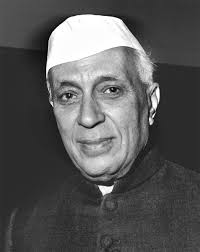 Jawaharlal Nehru was independent India’s first Prime Minister (1947 to 1964) and a towering figure of twentieth century world politics. Prior to independence, he served as the pre-eminent spokesperson for the Indian National Congress on matters of foreign affiliation (such as managing relations with organisations such as the League against Imperialism) and later, served as his own Minister of External Affairs. His challenge to the Western-dominated international political order in the twentieth century was framed through his critique of great-power politics and the global capitalist economy.
Jawaharlal Nehru was independent India’s first Prime Minister (1947 to 1964) and a towering figure of twentieth century world politics. Prior to independence, he served as the pre-eminent spokesperson for the Indian National Congress on matters of foreign affiliation (such as managing relations with organisations such as the League against Imperialism) and later, served as his own Minister of External Affairs. His challenge to the Western-dominated international political order in the twentieth century was framed through his critique of great-power politics and the global capitalist economy.
A predominant focus of Indian foreign policy, under his command, was on subverting these oppressive imperial hierarchies and structures. This manifested itself at two levels. First, domestically, for Nehru, the promise of Swaraj was chiefly about reversing the condition of colonial deprivation and reconciling divisions along class, caste and communal axes. Politically, democracy was seen as the only representative format that could ably accommodate the inherent diversity and differences of the Indian social sphere. Economically, socialism defined as state control over vital industries and re-distribution of resources, was adopted as the creed for postcolonial governance in order to uplift the peasantry. Second, at the international level, there was an emphasis on creating a political environment conducive to the realisation of such a project. Therefore, even the form of nationalism fomented by the Indian freedom struggle had a strong internationalist tenor.
In this respect, Nehru’s most well-known conceptualisation was that of Non-Alignment (NA). NA was emblematic of the leaders of newly independent countries exploiting the normative malleability of the post-World War II era to generate the space for alternative paths to modernisation. Nehru in particular used it as an instrument to repudiate the hegemonic ‘politics of fear’ characteristic of great power competition, and to preserve India’s hard-won sovereignty.
Moving beyond the scope of national policy, Nehru also saw NA as a befitting normative framework for the de-colonising world; resting on the two concepts of ‘non-aggression’ and ‘non-interference’. This led to the de-legitimization of coercive practices such as military alliance formations, and subsequently to the failure of overtures such as the South-East Asian Treaty Organisation. Additionally, Nehru’s NA also stopped the Cold War from turning ‘hot’ by allowing India to act as a key mediator between warring parties during the Korean, Indo-China and Suez Crises.
Conventional workings and study of international politics seldom account for the agency of small and middle powers, but NA allowed Nehru’s India, and member states of the “Third World” more generally, to mobilise their collective voice to make effective contributions to vital debates on the future of the ‘international’ such as those on nuclear disarmament at the United Nations. Nehru’s intellectual commitments played a key role in securing for India status and influence far exceeding its material capacity, and laying the foundation for the Global South’s resurgence in international politics.
Essential Readings:
Nehru, Jawaharlal 1975. Glimpses of World History, New Delhi: Asia Publishing House.
Nehru, Jawaharlal 1964. Discovery of India, New Delhi: Asia Publishing House.
Nehru, Jawaharlal 1941. Towards Freedom, New York: The John Day Company.
Further Readings:
Khilnani, Sunil 2017. The Idea of India, New York: Penguin.
Raghavan, Srinath 2010. War and Peace in Modern India, Basingstoke: Palgrave Macmillan.
Estrada, Kate Sullivan de and Basrur, Rajesh 2017. Rising India: Status and Power, New York: Routledge.
Questions:
1. What imagination of the ‘international’ did the Nehru’s confrontation with Empire produce?
2. How can we distil the logic of Nehru’s ideational challenges to hegemonic structures to disrupt dominant theories of IR?
3. How can Nehru’s innovations aid the formulation of policy solutions to contemporary issues in world politics?
Submitted by Ameya Singh.